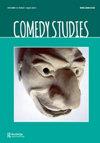How digital platforms facilitate parody: online humour in the construction of Hong Kong identity
Q1 Arts and Humanities
引用次数: 0
Abstract
Abstract Previous works on Hong Kong identity and popular culture focused on films, television and music. Few studies investigate humour outside of these media and the humour of online communities. This study argues that humour is an important vehicle of identity construction, especially with the dominance of online platforms in modern communication. Using Benign Violation Theory and Ontological Semantic Theory of Humor, this study demonstrates how the trolling culture online has been an effective tool to subvert and negotiate the mainstream narrative of identity, embodied by the motto of ‘You lose if you’re serious.’ This paper analyses humorous ‘trendy posts’ from the Encyclopedia of Virtual Communities in Hong Kong and shows how satire and parody in Cantonese are used in online platforms to build the local Hong Kong identity as opposed to wider, national Chinese identity. What makes trendy posts special is the heavy use of Cantonese and references to local subculture and celebrities, often with the intention to mock and defy the narrative of mainstream television channels and shrinking local film industry. This study argues that such in-group connection and identity building are often a decentralised and bottom-up process, given that online contents are generated by users, who organically negotiate authenticity and membership. Serving the need for story retelling, humour is argued to be the perfect vehicle for collective memories and identity building for online communities.数码平台如何促进恶搞:建构香港身份的网络幽默
摘要以往关于香港身份和流行文化的作品主要集中在电影、电视和音乐方面。很少有研究调查这些媒体之外的幽默和网络社区的幽默。这项研究认为,幽默是身份建构的重要载体,尤其是在网络平台在现代传播中占据主导地位的情况下。本研究运用善意侵犯理论和幽默本体论语义理论,展示了网络钓鱼文化如何成为颠覆和协商主流身份叙事的有效工具,其座右铭是“如果你是认真的,你就会输”本文分析了《香港虚拟社区百科全书》中幽默的“潮流帖子”,并展示了在网络平台上如何使用粤语讽刺和戏仿来建立本地香港身份,而不是更广泛的民族身份。潮流帖子的特殊之处在于大量使用广东话,并提及当地亚文化和名人,往往是为了嘲笑和挑战主流电视频道和萎缩的当地电影业的叙事。这项研究认为,鉴于在线内容是由用户生成的,他们有机地协商真实性和会员资格,这种群体内的联系和身份构建通常是一个去中心化和自下而上的过程。幽默满足了故事复述的需要,被认为是网络社区集体记忆和身份构建的完美载体。
本文章由计算机程序翻译,如有差异,请以英文原文为准。
求助全文
约1分钟内获得全文
求助全文
来源期刊

Comedy Studies
Arts and Humanities-Literature and Literary Theory
CiteScore
0.60
自引率
0.00%
发文量
26
 求助内容:
求助内容: 应助结果提醒方式:
应助结果提醒方式:


